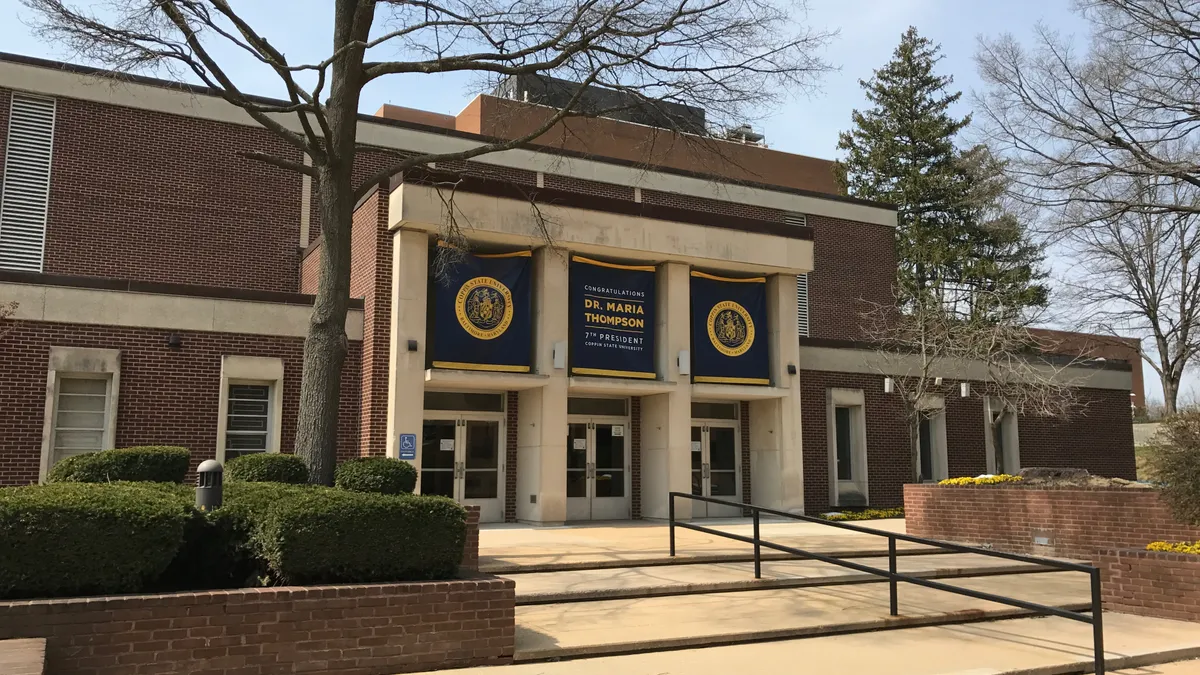Dive Brief:
- Bipartisan engagement is crucial for addressing the systemic underfunding of historically Black colleges and universities, according to new research from the Hunt Institute, a nonprofit affiliated with Duke University's public policy school.
- Two new entries in a three-part research series use two states — Maryland and Tennessee — as case studies of where legislative bipartisanship is being used to address HBCU underfunding.
- Lawsuits and the court system often lead to costly and slow-moving attempts to correct underfunding, according to the research, although it also notes legal action can be a catalyst for change.
Dive Insight:
Garnering bipartisan support can help state leaders resolve HBCU underfunding challenges, according to the Hunt Institute's research. While lawsuits can bring attention to funding inequities, they can also prevent collaboration if sides dig in for the sake of winning.
Maryland is an example of both. In 2006, HBCU advocates sued the state, alleging it underfunded its historically black institutions while allowing traditionally White institutions to poach students by duplicating HBCU programs.
The state ultimately settled the lawsuit in 2021 by agreeing to pay $577 million to its four HBCUs over a decade, beginning in July 2022. In the first year, Morgan State University will receive an extra $24 million, Bowie State University will get $16.8 million, University of Maryland Eastern Shore will get $9.7 million and Coppin State University will receive $9 million.
While the plaintiffs reached their goal, it took 15 years to achieve.
"You did see a prolonged timeline in reaching a resolution," said Madeline Smith, director of higher education at the Hunt Institute. "If not for that bipartisan support, there could have been even more challenges."
The settlement money came from a bill cosponsored by 39 senators from both political parties at the beginning of 2021. It passed 120-14 in the state House and unanimously in the Senate.
Increasing public support was also instrumental to Maryland's success, according to Smith.
The group behind the lawsuit reignited public interest in the case through an awareness campaign in 2019. That outreach is what ultimately led to Maryland legislators allocating funds for the settlement, according to the institute's research.
Despite their drawbacks, lawsuits remain a popular option for HBCU backers to try to force underfunding remediation, especially as publicity tools. In September, half a dozen students at Florida A&M University sued the state and the leaders of its public university system, mirroring the lawsuit in Maryland. Florida underfunded Florida A&M and allowed traditionally White colleges to duplicate the university's unique programs, the ongoing lawsuit alleges.
By proactively seeking legislative solutions to HBCU underfunding, state lawmakers can avoid potential lawsuits, according to the research.
One example of this is Tennessee, according to the Hunt Institute.
States are supposed to divide federal funds equitably between their land-grant institutions. Tennessee has two such institutions — Tennessee State University, an HBCU, and the University of Tennessee, a predominantly White institution.
But a 2021 report found the state may have skipped up to $544 million in matching payments to Tennessee State between 1956 and 2006.
The report came from a bipartisan investigative committee created by the state's general assembly. Following its work, Republican Gov. Bill Lee proposed $250 million for Tennessee State in his 2021 State of the State address.
Ultimately, the final 2022-2023 budget allotted Tennessee State $318 million to renovate and maintain campus infrastructure improvements, including a new engineering building. Involving the governor in funding plans can signal HBCU funding is a state priority, according to the research.













